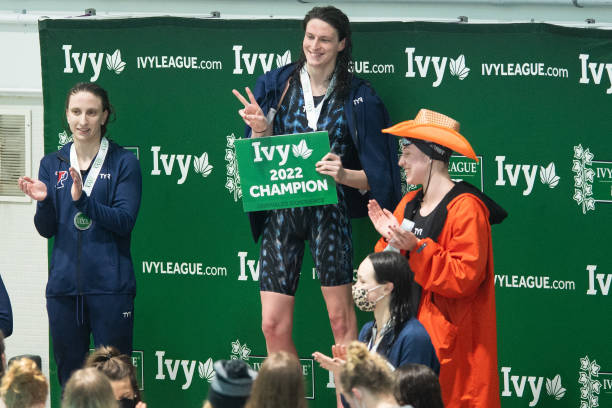An op-ed featured in NBC compared famed Penn transgender swimmer Lia Thomas to Jackie Robinson – the first black American to play professional baseball.
Written by Cheryl Cooky, Purdue University professor of American and gender studies, the op-ed argues that Thomas’ recent string of victories at the NCAA swimming championships, in which he beat out two silver Olympic medalists, “should be celebrated” as an advancement of women’s sports. According to Cooky, Thomas, a man living as a woman, has shattered the notion of the sex segregation of women that sports have often promoted.
“How does one advocate for equitable treatment while also adhering to the notion of biological difference?” asks Cooky. “If separate is not equal in the case of schools, bathrooms, restaurants or other social institutions, can separate ever truly be equal in the case of sports? Would gender-based discrimination in sports be eradicated if sports were gender-integrated?”
After hailing the NCAA for allowing transgender people to compete, Cooky then argues that scientific evidence does not show that transgender people have advantages over women, even though Thomas, who was ranked 462nd when competing with other men, has now suddenly dominated Olympic medalists.
Transgender UPenn swimmer Lia Thomas. (Kathryn Riley/Getty Images)
“Attempts to ban or limit the participation of trans athletes are not based on science,” she claims. “Instead, they are rooted in societal and cultural definitions of what constitutes gender or what defines a woman.”
“Such questions matter because sports are organized based on the belief of natural differences between men and women, and they are sex-segregated as a result,” she adds. “Yet, this ultimately leads to the discrimination of athletes like Thomas.”
Recalling the landmark Supreme Court decision that desegregated public schools, Brown v. Board of Education, Cooky claims that sports have essentially been able to operate under a “separate but equal” philosophy through sex segregation.
“The presumed physical inferiority of girls and women historically has justified, legitimated and excused the unequal treatment of female athletes,” she exclaims, citing the U.S. Soccer Federation’s claim that “there were differences in speed and strength of the men’s and women’s teams, which partly explained any disparities in pay.”
Characterizing Lia Thomas as an agent of change, Cooky goes as far to compare him with the likes of Jackie Robinson:
Today, athletes like Jackie Robinson are celebrated as ‘breaking the color barrier’ in sports, although that narrative often requires sanitizing, simplifying or rewriting a more complex, nuanced and contradictory history.
There remains though a cultural investment in celebrating sports’ ‘firsts,’ whether that be Robinson as the first Black MLB player, the first openly gay active player in the NBA, the first nonbinary U.S. athlete to participate in the Winter Olympics or the first woman to score in a Power Five college football game. Many of the athletes who become the ‘first’ encounter resistance, backlash and opposition, especially from those who have historically benefited from the status quo in sports.
Cooky is several months late to the Lia-Thomas-is-Jackie-Robinson game. In January, none other than Lia Thomas himself made the comparison, according to several teammates.
“I try not to be around her because the whole situation makes me so mad,” an anonymous teammate told the Washington Examiner. “I don’t think Lia is a bad person. She’s very quiet and kind of introverted … It’s just really hard for me to respect her at all because of what she’s doing to my team and what she’s doing to women in general and not caring.”


COMMENTS
Please let us know if you're having issues with commenting.